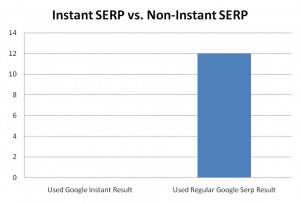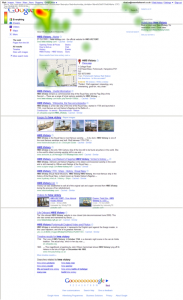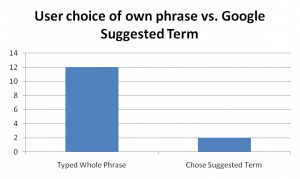No One Is Looking At Google Instant
- By: Clayton Truscott
- Published: 11 September 2010
- Tags: technology
New Google Instant search results arrived in our browsers approximately 48 hours ago. This update to the way Google shows search results has provided many an excitable SEO and PPC manager with a belly quivering thrill. Google Instant transforms your static SERP into a changing kaleidoscope of results with each character you type. How exciting! Links being the key was becoming so dull and predictable!
Users will surely be all over these fabulous Google Instant results like a flannel! I must understand them...
So with the magnificent power of our magical eyetracking heatmapping supersoaker 5000 and an initial sample of 14 searches performed by Internet users aged 18 - 45yrs, we set about testing Google Instant.
This is what we found:
1. Users Are Unaware Of Google Instant Results
Not a single user in our tests clicked on the Instant search result in lieu of a selecting a site from the regular SERP.
Data to prove it you say?
This is based on a sample of 14 searches performed by 7 users of mixed internet usage experience, with each one being asked to perform 2 searches:
"On Google, please search for anything you search regularly"
"Again on Google, please search for something you buy or need to buy online"
We're working on making videos of the tests available. We're also continuing to test to increase our sample.
However, one thing so far has been clear. As our users typed their search query into Google they did not pause to look at the screen after each letter typed. They consistently looked down at the keyboard and so did not notice the changing Google Instant SERP, let alone click on any of the results that Instant served up.
No one stopped typing their query in order to click on a Google Instant result.
More evidence you say? Here are two examples of what our eye tracking tools told us users looked at as they searched. Results from all of our user tests looked identical to this:
This black blob is a gaze opacity visualization. It is essentially a reverse of a heat map. The areas which were most concentrated on are white in this version, suggesting no concentration as opposed to red areas on a heat map.
Here is the heatmap version of the same search:
Evidently, users are so darned intent on getting to the end of their search phrase they have no inclination to gaze anywhere else.
As I mentioned, we're working to increase our sample size, but let's be clear about one consistent finding; no clicks went to the Instant search result.
2. Our Users Did Not Utilise Google's Suggested Search Terms
Much. Of our 14 tested searches, 2 resulted in a selection of an auto-complete term. Interestingly, both times, it was the same user which suggests that search habits may be behavioural:
Was there a barrier to our test users selecting the suggested term? Did Google's suggested search terms fail to match the query the user had in mind? Was finding the exact match term from all the suggestions in the drop down simply too difficult?
Not really. Google did a good job of predicting what the user was looking for and it was often presented within the top 3 suggestions. Our test users simply chose to ignore it.
To assess exactly how much effort was required from the user in order to find the suggested version of their search term we recorded:
1. The number of characters typed before their search term was suggested and
2. The position of that term in the suggestions drop down.
Perhaps people have a strange possessiveness over their search query and don't want Google's suggestions, they're perfectly happy with deciding what they want all by themselves thank you very much.
Perhaps, yet again, an average user is very concerned with what they are typing, too concerned to be distracted by Google's suggestions, or its Instant results.
3. If Users Don't Pay Attention To Google Instant, Does It Change Anything At All?
Google Instant changes Adwords profoundly. With regards to natural search, nothing changes for the moment.
As a wise colleague of mine pointed out, "as with all new features added to any website, if you don't clearly point out the change and its benefits, not everyone will notice them never mind be impressed by them". Average Joe doesn't know Google Instant exists, and so long as your website is reliant on Average Joe, rather than Geekazoid Steve, you might not see a great deal of change in your traffic.
Add to this the fact that you have to be logged in to a Google account to see the Instant results and it seems that Google Instant affects a relatively minor slither of the traffic which is most important to most websites.
Google Instant may have a behavioural impact over time, adjusting the way people search. Perhaps, once people understand to look for the Instant results, we'll see more clicks going to the kaleidoscopic pre emptive SERP.
But in the meantime, I'm going to continue looking at what the eyetracking plexum magic 500 tells me to be true:





